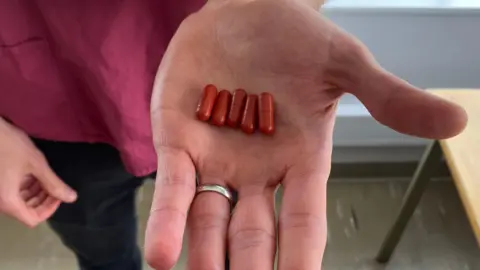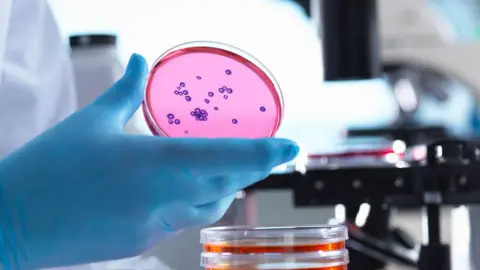 GSTT
GSTTUK doctors are attempting to clear dangerous superbug infections using “poo pills” containing freeze-dried faeces.
The stool samples come from healthy donors and are packed with good bacteria.
Early data suggests superbugs can be flushed out of the dark murky depths of the bowel and replaced with a mix of healthy gut bacteria.
It is a new approach to tackling infections that resist antibiotics, which are thought to kill a million people each year.
The focus is on the bowels which are “the biggest reservoir of antibiotic resistance in humans” says Dr Blair Merrick, who has been testing the pills at Guys and St Thomas’ hospitals.
Drug-resistant superbugs can escape their intestinal home and cause trouble elsewhere in the body – such as urinary tract or bloodstream infections.
“So there’s a lot of interest in ‘can you get rid of them from the gut?’,” says Dr Merrick.
The idea of poo-pills isn’t as far-fetched as it might seem. Faecal transplants – also known as a trans-poo-tion – are already approved for treating severe diarrhoea caused by Clostridium difficile bacteria.
But scientists noticed hints that faecal transplants for C. difficile also seemed to get rid of superbugs.
New research has focused on patients who had an infection caused by drug-resistant bacteria in the past six months.
They were given pills made from faeces which people had donated to a stool bank.
Each stool sample is tested to ensure it does not contain any harmful bugs, undigested food is removed and then it is freeze dried into a powder.
This is stored inside a pill that can pass through the stomach unscathed and reach the intestines where it dissolves to release its poopy powdery payload.
 Getty Images
Getty ImagesThe trial has taken place on 41 patients at Guy’s and St Thomas’ hospitals in London to lay the groundwork for a large-scale study.
It showed patients were up for taking a poo pill and the donated bacteria were still being detected in the bowels at least a month later.
Dr Merrick says there are “really promising signals” that poo pills could help tackle the rising scourge of superbugs and that donor bacteria could be going to microbial war with the superbugs as they compete over food and space on the lining of the gut and either rid the body of them completely or “reduce them down to a level that doesn’t cause problems”.
The study also suggests the array of gut bacteria becomes more varied after the therapy. This is a sign of good health and “may well be promoting colonisation resistance” so it is harder for new infectious bugs to get in.
“It’s very exciting. There’s a real shift from 20 years ago where all bacteria and viruses were assumed to do you harm; to now where we realise they are completely necessary to our overall health,” says Dr Merrick.
Earlier this week scientists showed the good bacteria our bodies meet – in the hours after we are born – seem to halve the risk of young children being admitted to hospital with lung infections.
Our body’s own human cells are outnumbered by the bacteria, fungi and others that live inside us – known as the microbiome.
This has led to research implicating the microbiome in everything from Crohn’s disease to cancer to mental health.
If poo pills are proven to work against superbugs in larger studies then the researchers think they could be used for both treatment and prevention in people at risk.
Medical procedures that suppress the immune system – including cancer therapies and organ transplants – can make the body more vulnerable.
“A lot of these individuals come to a lot of harm from drug resistant organisms,” Dr Merrick.
The UK’s drugs regulator – the Medicines and Healthcare Products Agency – said there were more than 450 microbiome medicines currently in development.
“Some of them will success, so I do think we will seem them coming through quite soon,” said Dr Chrysi Sergaki, the head of microbiome research at the MHRA.
“We could potentially, in the future, replace antibiotics with microbiome [therapies] – that’s the big picture, so there’s a lot of potential.”
www.bbc.com
#Doctors #poo #pills #flush #dangerous #superbugs






